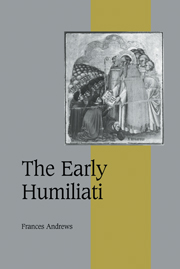Book contents
- Frontmatter
- Contents
- Acknowledgements
- List of abbreviations
- Map
- Introduction
- 1 Tradition and history
- 2 The beginnings of the Humiliati: the twelfth-century evidence
- 3 Quia in nullo peccabant: the inspection and approval of the Humiliati 1199–1201
- 4 Rules
- 5 In search of communities
- 6 New members and profession of vows
- 7 Unity and uniformity: the development of a centralised order
- 8 The Humiliati and the Church in the localities
- Conclusion
- Appendices
- Bibliography
- Index
- Cambridge Studies in Medieval Life and Thought: Fourth Series
7 - Unity and uniformity: the development of a centralised order
Published online by Cambridge University Press: 02 November 2009
- Frontmatter
- Contents
- Acknowledgements
- List of abbreviations
- Map
- Introduction
- 1 Tradition and history
- 2 The beginnings of the Humiliati: the twelfth-century evidence
- 3 Quia in nullo peccabant: the inspection and approval of the Humiliati 1199–1201
- 4 Rules
- 5 In search of communities
- 6 New members and profession of vows
- 7 Unity and uniformity: the development of a centralised order
- 8 The Humiliati and the Church in the localities
- Conclusion
- Appendices
- Bibliography
- Index
- Cambridge Studies in Medieval Life and Thought: Fourth Series
Summary
Ut quasi unum corpum unum capud habentes …
This chapter takes a final look at the questions of unity and uniformity among the early Humiliati, using the extant papal letters to explore the attitudes of central authority. A key requirement for uniformity is united and acknowledged leadership and as we have seen, some local leaders, notably the ‘senior professed ministers’ of Verona, acquired prominence in the first half of the thirteenth century, which allowed them to impose their customs on houses in the area. Yet the early representatives who travelled to the Curia on behalf of all the Humiliati do not seem to have been replaced. Nor is there early evidence for meetings of the General Chapter as required in the papal legislation of 1201. These omissions perhaps contributed to the continued problems with divergent observance, confirmed as much in papal correspondence as in the notarial documentation discussed in earlier chapters. In 1226 controversy over old and new customs at the Brera in Milan prompted a petition to Honorius III. Partly as a response to such difficulties, in 1227 Omnis boni principium was reissued and papal visitations were introduced, apparently for the first time. As we have seen, these actions seem to have produced changes in the practice and recording of professions in the area of Verona. It will be argued here that visitation also contributed to more fundamental constitutional changes which introduced rule by a Master General in 1246 and the complete restructuring of the lines of authority in the order.
- Type
- Chapter
- Information
- The Early Humiliati , pp. 202 - 219Publisher: Cambridge University PressPrint publication year: 2000



